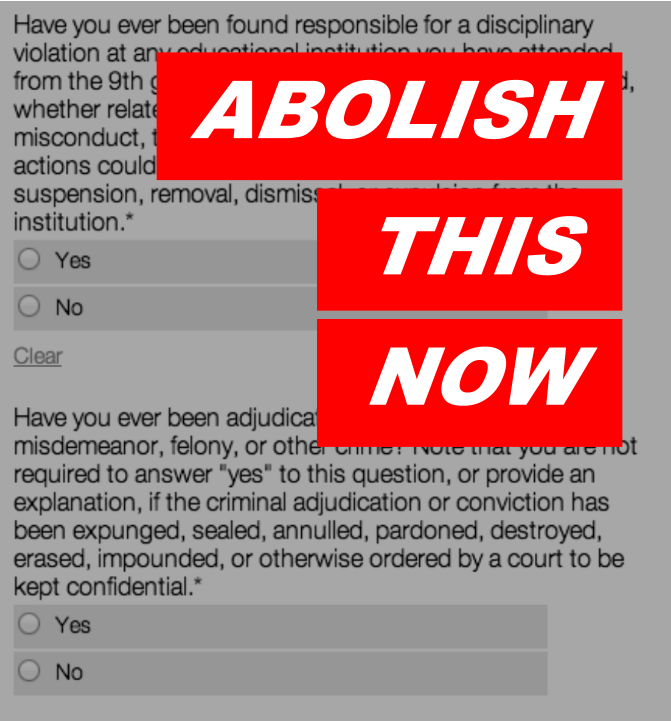Meet the Group of Students Who Want to Abolish the Box

By:
Every year, more than 1 million students use something called the "Common Application." This is a standardized college application that is accepted by more than 500 institutions, including many outside the U.S.
One problem many have raised with this application is that it includes questions about whether a student has been convicted of misdemeanors or felonies, and it asks if the applicant was the subject of certain disciplinary action during high school. If the answer is "yes," you check a box. The questions were added to help colleges and universities screen candidates for risks of criminal behavior before they are accepted.
RELATED: 5 Companies That Support Second Chances For Felons
Workplace applications have had similar questions, leading to a campaign called Ban the Box, which was created to remove them, arguing that they do not serve the function for which they were designed and unfairly stigmatize otherwise appropriate job seekers; it is supported by politicians such as presidential candidate Bernie Sanders and Sen. Elizabeth Warren (D-Mass.).
 Facebook/AbolishtheBox - facebook.com
Facebook/AbolishtheBox - facebook.com
Now students are mounting their own campaign targeting the Common Application, called Abolish the Box, started by a coalition of students from across the country; it is beginning to gain traction.
"Abolishing the Box is important because we believe in affirming the humanity of all people and supporting the self-determination of oppressed communities," Gina Hong, an activist with Abolish the Box, told ATTN:. "We refuse to believe in punishment as a response to pain and harm, and we believe that criminalization has impacted all oppressed peoples."
She said we cannot have a "just and sustainable world" without systems that allow everyone to participate.
Others argue that the Common Application questions don't predict criminal behavior or success in college. Abolish the Box is important because it is not a radical move by colleges/universities to do so," Andrew Cory Greene, another activist with Abolish the Box, told ATTN:. "All the empirical and historical evidence says that the box should not exist. If we analyze the box in regard to campus safety and who graduates, the box does not correlate or tell us anything about who will engage in a documented crime on campus, who’s going to graduate and at what rate one will graduate."
Greene said, though it's not a radical step, getting rid of the box is an important step, because it can remove an obstacle from people seeking an opportunity they might not have previously been able to access. People "should understand the adverse impact and shortage of social networks, resources and college degrees due to generations of not having access to quality education," he said.
Greene knows what it's like to face the box. He went to prison for some time before deciding to enroll in college. Though Greene was able to get into school and succeed, he knows many are barred from the same achievement. Furthermore, Greene is an example of how someone with a criminal record can be a benefit to the school environment, rather than a risk.
The New York Times reported in an editorial in March that many schools are even asking for rap sheets, compelling applicants to reveal such criminal records as minor alcohol offenses. Moreover, rap sheets can include inaccurate or nonpublic information, The Times found. A study from the Center for Community Alternatives (PDF) found that a criminal record does not typically indicate if someone wil be a risk to other students on campus.
The Student Peace Alliance, one of the groups involved with the campaign, has helped facilitate a few initiatives to kill the box. They have both a sign-on letter for organizations and a petition for everyone to change things. The petition has received more than 1,000 signatures.
Many of the activists with whom we spoke echoed an argument from the Ban the Box campaign: The box disproportionately involves minorities, who are most likely to have interacted with the criminal justice system.
Activist Eric Strum pointed out roughly one-in-three people have an arrest record. Added Joel Simwinga: "It viciously and unforgivingly targets the most vulnerable segments of the population and grants extraordinary license to the most privileged."
"My hope is that the Common Application recognizes how much of a difference it could make to abolish the box, and that they choose to remove this awful barrier," said Sally Kaplan, a facilitator of the coalition. "They can help to make our college campuses more inclusive, more diverse, more informed, and more open."
RELATED: Why This Convicted Marijuana Felon Wants His Life Back
Though these people are passionate about abolishing the box, they are aware this is only one small step toward solving a greater issue. "Eliminating imprisonment is the long term vision I’m organizing for, but addressing collateral consequences is necessary now," said Arielle Neckritz. "I think admissions policies is an important starting point for addressing the barriers formerly incarcerated people face when they leave prison."
ATTN: reached out to the Council for the Advancement and Support of Education/Common Application.org, but no one responded by the time we wrote this story.
Learn more about how people are speaking out about life after prison in this ATTN: video.
